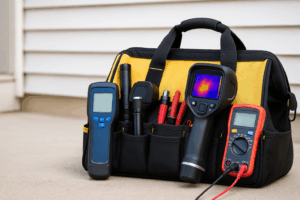What Tools Does a Home Inspector Use? A Look Inside Mason Home Inspections’ Toolbox
When you schedule a home inspection with Mason Home Inspections, you’re not just getting a walk-through and a clipboard checklist. You’re getting a detailed assessment backed by professional training and the right tools to find things most people wouldn’t notice.
Whether you’re buying your first home in Chisago County or selling a lakefront cabin near Center City, the tools used during your home inspection play a key role in helping you make confident, informed decisions.
Let’s take a closer look at the essential tools used by Mason Home Inspections — and why they matter.
Moisture Meter
Water damage is one of the m
ost common and costly issues found in homes. I use both pin-type and pinless moisture meters to check for hidden leaks behind walls, under flooring, and in ceilings. These tools help identify areas with elevated moisture that could lead to mold or structural damage, especially in bathrooms, kitchens, and basements.
Thermal Imaging Camera
I use an infrared thermal imaging camera to detect temperature differences in walls, ceilings, and floors. This tool can reveal:
-
Missing insulation
-
Electrical hotspots
-
HVAC duct leaks
-
Moisture intrusion
While thermal imaging isn’t always needed in every inspection, it’s a powerful way to catch hidden issues that aren’t visible to the naked eye.
Electrical Testers
A home’s electrical system must be safe and up to code. I carry:
-
Non-contact voltage testers to check for live wires
-
Multimeters to test voltage and continuity
-
GFCI outlet testers to ensure ground fault protection in kitchens, bathrooms, and garages
These tools allow me to verify that outlets are wired correctly and safely.
Gas Leak Detector
If your home uses natural gas or propane, a gas leak detector is used around appliances and pipes to ensure there are no leaks. Even a small leak can become a serious safety hazard, so this is a key part of any home ins
pection.
Flashlights and Headlamps
Some areas of a home are dark or hard to reach — think crawlspaces, attics, and utility closets. I use high-lumen LED flashlights and hands-free headlamps to fully inspect every nook and cranny. Poor lighting won’t stop me from getting a clear view of your home’s condition.
Ladders
Access to attics, roofs, and elevated areas is made possible with telescoping ladders. These are compact, portable, and sturdy. While I do not use drones, I always visually inspect roofs from the ground or from a ladder when it is safe and practical to do so.
Inspection Camera (Borescope)
When needed, I use a borescope camera — a small camera on a flexible cable — to inspect tight spaces like wall cavities, HVAC ducts, and under cabinetry. This tool is excellent for identifying hidden damage, pest activity, or wiring issues in hard-to-reach areas.
Level and Plumb Tools
Crooked floors or misaligned walls may point to deeper structural issues. A bubble level or digital level helps identify sloping or settling. While cosmetic in some cases, unevenness can also be a red flag for foundation movement or poor workmanship.
Measuring Tools
Measurements matter. I use tape measures and laser distance meters to check room dimensions, window height, stair rise/run, and other key components. This ensures things are built to standard and meet code.
Carbon Monoxide and Combustion Gas Detectors
To keep you and your family safe, I use CO detectors to check for carbon monoxide near furnaces, water heaters, and gas appliances. These silent threats can go unnoticed, so this check is a critical part of any inspection.
Mobile Reporting Software
At Mason Home Inspections, I use professional reporting software (Spectora) on a tablet to document findings, capture photos, and create clear, detailed inspection reports. You’ll receive a modern, mobile-friendly report that highlights key issues with visuals, descriptions, and recommendations — typically delivered the same day.
Final Thoughts
Having the right tools matters. At Mason Home Inspections, each inspection is backed by experience and the best equipment to give you an honest, thorough look at the home’s condition. These tools help uncover what you can’t see, giving you peace of mind before signing on the dotted line.
If you’re buying, selling, or simply want a better understanding of your home’s condition, schedule an inspection today with a licensed Minnesota home inspector who brings the right tools — and the experience to use them.
Ready to book your home inspection?
Call Mason Home Inspections at 651-786-9988 or visit masonhomeinspections.com to request an appointment.


Leave a Reply
Want to join the discussion?Feel free to contribute!